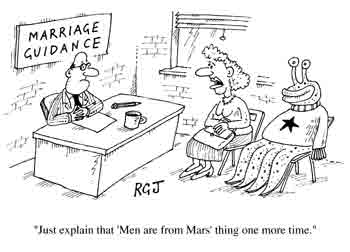The good folks from Artfibers, a prominent yarn store at 266 Sutter St. in San Francisco, CA, made this recent post in the forums:
I own one of the oldest and best yarn stores in San Francisco — Artfibers. Six months ago our name came up in a Google search “yarn San Francisco”. Now we do not. It seems that Google is determined to destroy our business. What can we do?
After several efforts by myself and another poster to help they proceeded to only get angrier at Google. I penned this response.
To seabright.nyle from Artfibers in San Francisco.
I understand that you are frustrated. I understand that Google Local results seem crazy and unpredictable to you and that you are angry. I understand that your time is limited but you feel compelled to explain all of this to Google. There is a reason for all of this:
Google is from Mars and most small business people are from Venus.
Let me explain.
Google solves big computational problems with algorithms. That is what they do, that is how they define themselves. On this particular computational problem of local search, they attempt to rank the 100 million or so world wide off-line businesses using on-line proxies. By that I mean that Google is looking to compare the importance of your business to another by looking across the Internet for signals that your real, substantial and significant Place in the real world has more prominence than another in your particular area of geography and specialty.
This is not small task that Google has undertaken. They use a statistical approach to improving the results and figure that if they can provide mostly accurate and relevant results and those are more accurate this week than last week than they are moving in the right direction. Computational and statistical approaches to the question of which businesses exist today and which are more important will never be 100% accurate. Your perception of reality and statistics rarely offer the same reflection of the real world.
You, on the other hand, think that your business deserves to be noticed, acknowledged and affirmed for the unique entity that it is. You feel that your business has earned this attention. Your business is often how you define yourself. When yours is one of the businesses that is affected by Google’s seemingly distant approach, you are justifiably angry.
But in this context your business is no more important to Google than a gnat on a the pettuti of an elephant is to that elephant. It might get noticed but it won’t change the general direction of travel. But it might also get swatted out of existence with the swish of a tail, regardless of ground truth.
You as a business owner can fight this tendency or you can take a more “go with the flow” approach. I have been doing both for over 6 years. I can tell you from a narrow cost benefit approach, understanding the flow and going with it is usually the most profitable approach for small businesses.
You can try to get support in the forums, you can attempt to e-mail Google or call them and ask why your prominent off-line business is not more prominent online in their search engine. You can argue until you are blue in the face that they are “getting it wrong”.
The answer you will likely get IF you do manage to break through the veritable Iron Curtain of silence and connect with a human is the same answer that Google provides in the Help Documents.
Google Maps search results are based primarily on relevance, distance, and prominence. These factors are combined to help us find the best match for your search.
Google Maps and Google Places are free services, so there’s no way to request or pay for a better ranking. In addition, we do our best to keep the details of the algorithm confidential in order to make the ranking system as fair as possible for everyone.
Their answer will make you will wonder if the people working there are any less computational and statistical than their algo. (I can assure you that they are.)
That leaves the “go with the flow” option. That means the “Google flow” or rather the flow as they have designed for they are big and you are little. You are the fly mentioned above.
This option means that you need to embark on an effort to learn how to make your business more relevant and more prominent in ways that Google (the machine, not the few humans behind the curtain) understands.
This effort will require either some time or some money. Perhaps more than you have readily available.
Either though is preferable to beating your head against that iron wall. Both directions will provide results. The latter though (the wall tactic) will provide just a headache.
